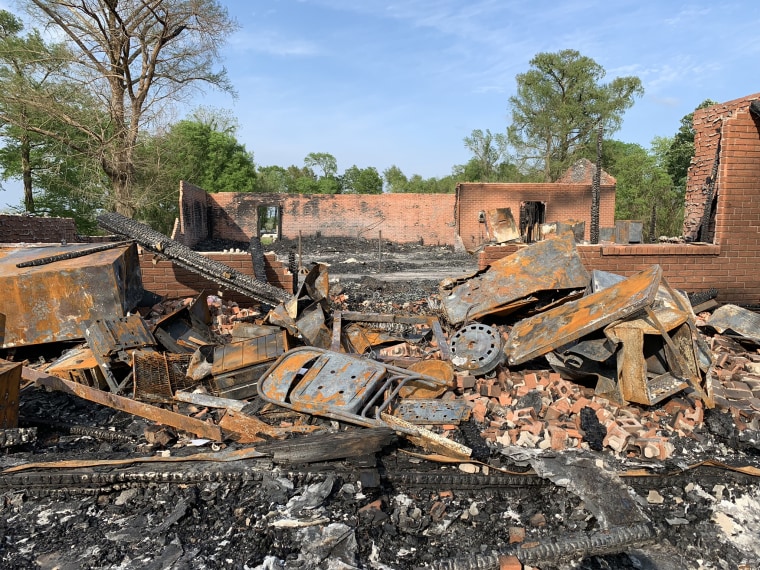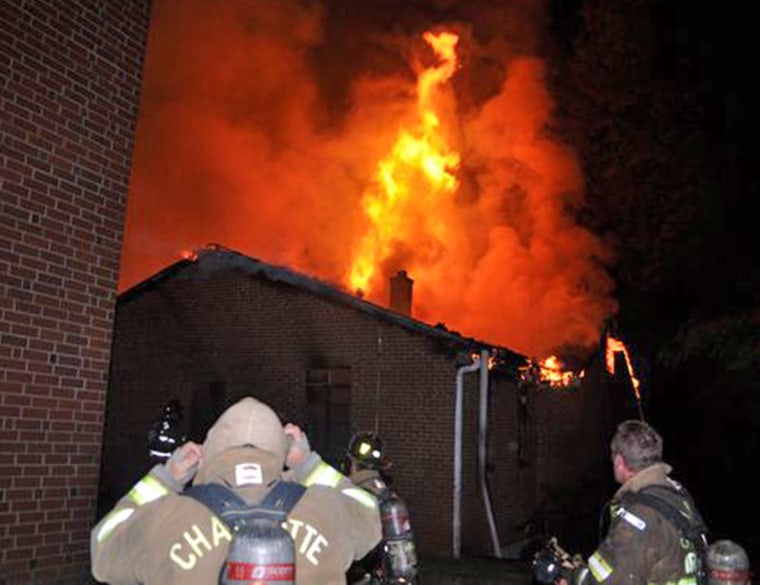The early involvement of federal authorities to help investigate a string of "suspicious" blazes that swallowed three black churches in Louisiana is vital during a time when hate crimes in the country are on the rise, historians and academics say.
And after a major fire burned down a social justice center in Tennessee less than two weeks ago — and led investigators to anti-Semitic graffiti — civil rights groups say it's even more urgent for officials to react swiftly.
"What is happening in Tennessee and Louisiana is domestic terrorism and we must not turn a blind eye to any incident where people are targeted because of the color of their skin or their faith," Derrick Johnson, the president and CEO of the NAACP, said in a statement.
About 200 people, including from the FBI and the Bureau of Alcohol, Tobacco, Firearms and Explosives, are examining the latest cases in Louisiana to help determine whether the fires were intentionally set and may have been motivated by racism or extremism. Following the third fire last week, State Fire Marshal Butch Browning told reporters that investigators have identified "suspicious elements" in each case and "we do believe that crimes have occurred."
All three churches were in St. Landry Parish, north of Lafayette, and were historically black. The first fire was reported on March 26 at St. Mary Baptist Church in Port Barre; the second on April 2 at the Greater Union Baptist Church in Opelousas; and the third last Thursday at Mount Pleasant Baptist Church, also in Opelousas and founded in the 19th century.
"There is clearly something happening in this community," Browning said in a statement.

The churches were empty at the time of the fires, officials said, and each suffered considerable damage, forcing worshippers to hold Sunday services at other locations. (A fourth fire last weekend at a church with a predominantly white congregation in another parish 200 miles away doesn't appear to be connected, authorities have said.)
St. Landry Parish, with a population of more than 83,000, is about 56 percent white and 42 percent black, census data shows. Police in the parish have told pastors at other black churches that they will step up safety patrols.
Christopher Strain, who studied the wave of black church burnings of the 1990s in his book, "Burning Faith: Church Arson in the American South," said that church arsons linked to hate crimes tend to spike alongside the general rise in hate crimes.
In Louisiana, "investigators have deemed these fires 'suspicious' and they certainly are: it's hard to see three such incidents in a limited geographic area in a short amount of time as coincidental," Strain, a professor of American studies at Florida Atlantic University, said in an email.
"Whether the targets are churches, synagogues, mosques, or other sacred spaces, arson is a well-worn tool in the white supremacist's toolbox," he added, "and it would not be surprising if investigators determined that these fires were hate-based or racially motivated."
Jack Levin, a professor emeritus at Northeastern University in Boston and co-director of the Brudnick Center on Violence and Conflict, said that given the legacy of racial strife in the South and how black houses of worship were targeted during the civil rights movement, authorities can't ignore a hate crime motivation.
"We've seen hate crimes on the rise and the number of organized hate groups growing in this country over the last several years," Levin said. "It's much more likely now that three black churches victimized by unknown perpetrators would be hate crimes and possibly the work of members of organized groups."
The FBI last fall reported a more than 17 percent rise in hate crimes across the country in 2017 from 2016 — the third consecutive year the numbers have increased.
In February, the Southern Poverty Law Center found hate groups increased by 30 percent in the past four years, reaching an all-time high.
The ATF, which tracks how houses of worship in the U.S. are targeted, found the majority of the more than 240 incidents in 2017 involved a Christian denomination and were categorized as "incendiary," involving some type of accelerant or device.
Of those incendiary fires, only one was motivated by "extremism," according to a U.S. Bomb Data Center report. Investigators cited "revenge" or "vandalism" in other cases. In the majority of the fires, however, the motivation was either not reported or not known.
In June 2015, a spate of fires damaged or destroyed several predominantly black churches in the South — coming on the heels of a white supremacist's massacre of nine people at a historically black church in Charleston, South Carolina.
But investigations of those fires later determined they were either unintentionally set, caused by lightning, or if there was evidence of arson, there was no indication it was motivated by racial bias.
Still, these latest fires in Louisiana can be unnerving for churchgoers because they conjure up images of past bombings and attacks. In 1964 alone, the Ku Klux Klan burned 31 mostly-black churches in Mississippi, Strain said.
"Church burnings, whether accidental or deliberate, are enormous traumas for congregations," he added. "These are houses of worship, where people pray and give thanks and become baptized and get married, places full of memories that are important to individuals, to families, and to communities."
Kenneth Robinson, pastor of The Creek Church in Charlotte, North Carolina — one of the black churches damaged in June 2015 — can't shake the helplessness he felt when he saw his already struggling church consumed in flames.

The congregation was forced to rebuild and the church rebranded itself following $250,000 worth of damages. (Before the fire, it was known as Briar Creek Baptist Church.)
Authorities have treated the case as arson, although they have not located a suspect or determined it was linked to a hate crime. It remains an open investigation.
Robinson, a third-generation minister, said Tuesday that even though no suspect has been caught, he learned a powerful lesson — one that has solidified his faith.
"We forgive the people that did it," he said. "You can't harbor hate. Even though this was afflicted on us and has affected us tremendously, financially and emotionally, we have to forgive."


